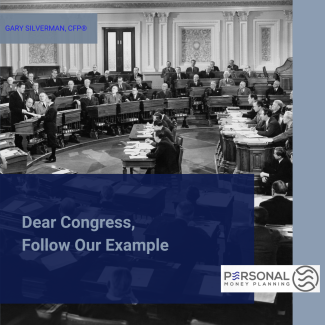
Dear Congress, Follow Our Example
By Gary Silverman, CFP®
Quite a while ago (likely over a decade ago, maybe two), I attended a presentation by the State of Texas. It was held in an auditorium at Midwestern State University that I think now is some sort of food service area. The talk was about the state’s water resources. This was before the last drought that scared (and scarred) the citizens of North Texas.
The presentation went over all of the water districts in our area: Analyzing anticipated future water needs and how the state was ensuring that those needs would be met. Not a single district was anticipated to be able to satisfy their future water needs through reservoirs or wells. But not to worry, there was another item on the list that zeroed out each and every district’s anticipated shortfall: Conservation.
It didn’t seem to matter if the communities affected showed a 1 percent, 10 percent, or 20 percent future shortfall; each one was going to “make it” just fine by having their citizens just stop using as much water as they were.
I thought it was bunk.
I was proven wrong.
Case in point: Wichita Falls. When the drought hit, we couldn’t supply the needs of our citizenry. People responded by conserving water. Some did it as a civic responsibility, others did it to save money, some to keep the city (or their neighbors) from showing up in their yards to explain the error of their watering ways. It, and some very innovative infrastructure, saved the day. Sort of.
In reality, we were still in trouble. The reservoirs were still going down. All who were here remember the massive rain system that parked itself over our area and poured down until the almost dry lakes filled to overflowing. Thing is, we wouldn’t have lasted long enough to enjoy the showers if it wasn’t for the remarkable ability of our area to conserve.
In Washington, a similar thing is happening. In fact, it happens rather often. As various spending packages make their way through Congress, they are deemed doable because they describe the outflow of money as low enough and/or the money coming in is high enough to pay for the program. Every time I look close enough at the proposals there is a line item that makes everything work just fine: Cutting fraud and waste from existing programs.
Now let’s think about this. If it was possible to cut fraud and waste wouldn’t we already be doing it? If it was possible, yet not happening, wouldn’t we fire the folks involved and get better management to solve the problem? And even if you did dump money onto the fraud and waste problem, how sure are we that it will go away? This sounds more like a real-life whack-a-mole situation.
It makes me wonder if our governmental institutions would be willing to do as we did during the drought. Are they willing to do the work and sacrifice to make ends meet—and why aren’t they doing it already? If not, why do we continue to rehire them?
Gary Silverman, CFP® is the founder of Personal Money Planning, LLC, a Wichita Falls retirement planning and investment management firm and author of Real World Investing.

